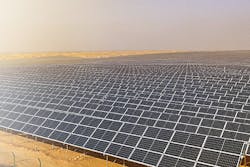Going South: Canadian Solar building $250M Solar Module Manufacturing plant in Texas
Ontario-based module manufacturer Canadian Solar announced it will locate a production facility in Mesquite, Texas.
The manufacturing site decision follows a move by Canadian Solar two years ago to relocate its subsidiary Recurrent Energy to the Texas state capital of Austin. The Lone Star State is already a national leader in wind energy projects and growing in solar and battery storage.
The anticipated $250 million factory, once completed and operational, is expected to produce a capacity of about 5 GW per year producing some 20,000 solar modules annually, according to Canadian Solar. Construction should begin later this year.
“Establishing this factory is a key milestone that will enable us to better serve our U.S. customers,” company founder and CEO Shawn Qu said in a statement. “We hope that this is the first of many long-term investments we expect to make in the U.S. as we think strategically about a sustainable and resilient clean energy supply chain.”
Once completed, this would be Canadian Solar’s first U.S. manufacturing facility. The country is receiving many commitments to locate energy transition sector production sites in the wake of incentives from several pieces of legislation during the Biden Administration, including the Infrastructure and Inflation Reduction Acts. Some of those companies vowing to build or having moved manufacturing into the U.S. include AESC, LG Solution, Microvast, FREYR Battery and Fluence Energy.
Read more on C&I Energy Transition Manufacturing Moves
See our latest newsletter with stories on Net Zero Building and Energy Efficiency
Texas already generates 26 percent of the utility-scale wind energy capacity nationwide, and several developers are building massive solar and hybrid solar-storage projects in or near the state.
“Texas is an energy production powerhouse, and we embrace an all-of-the-above energy strategy,” U.S. Sen. Ted Cruz, R-Texas, said. “It’s great to see this incredible investment in Mesquite,” he added, noting that the project could employ some 1,500 people.
Canadian Solar, through its subsidiaries such as CSI Solar and CSI Energy Storage, is a supplier for generation equipment for multiple energy transition projects around the world. On the solar front, it reported shipping some 6.1 GW of solar module capacity in the first quarter.
The company also reported about $84 million in first-quarter net income.
About the Author
Rod Walton, EnergyTech Managing Editor
Managing Editor
For EnergyTech editorial inquiries, please contact Managing Editor Rod Walton at [email protected].
Rod Walton has spent 17 years covering the energy industry as a newspaper and trade journalist. He formerly was energy writer and business editor at the Tulsa World. Later, he spent six years covering the electricity power sector for Pennwell and Clarion Events. He joined Endeavor and EnergyTech in November 2021.
Walton earned his Bachelors degree in journalism from the University of Oklahoma. His career stops include the Moore American, Bartlesville Examiner-Enterprise, Wagoner Tribune and Tulsa World.
EnergyTech is focused on the mission critical and large-scale energy users and their sustainability and resiliency goals. These include the commercial and industrial sectors, as well as the military, universities, data centers and microgrids. The C&I sectors together account for close to 30 percent of greenhouse gas emissions in the U.S.
He was named Managing Editor for Microgrid Knowledge and EnergyTech starting July 1, 2023
Many large-scale energy users such as Fortune 500 companies, and mission-critical users such as military bases, universities, healthcare facilities, public safety and data centers, shifting their energy priorities to reach net-zero carbon goals within the coming decades. These include plans for renewable energy power purchase agreements, but also on-site resiliency projects such as microgrids, combined heat and power, rooftop solar, energy storage, digitalization and building efficiency upgrades.

